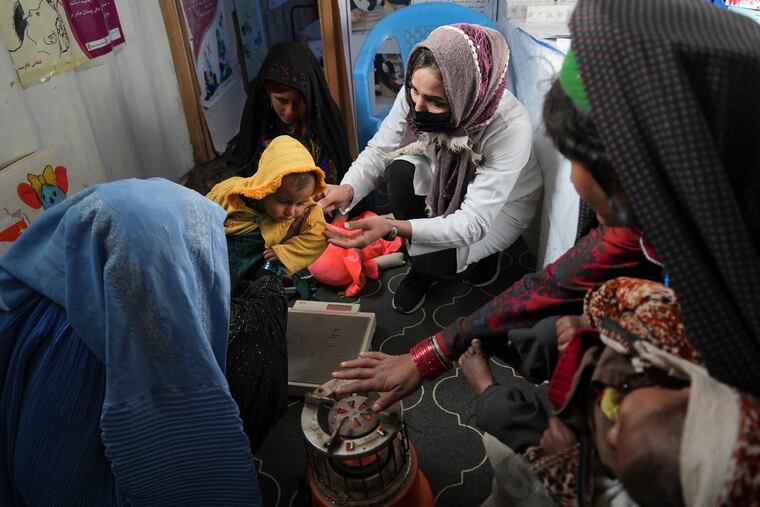Millions face starvation in Afghanistan. Two Philadelphians are trying to stop it.
“This is a campaign for humanity,” said Naser Shahalemi, a Kabul-born, University City businessman

Millions of people could starve to death in Afghanistan this winter.
Two Philadelphians are trying to prevent that from happening.
“This is a campaign for humanity,” said Naser Shahalemi, 42, a Kabul-born, University City businessman who helps lead a new and burgeoning awareness campaign, End Afghan Starvation. “Twenty years we were helping them, and now we’re not helping them?”
He and Gulmakai Popal Saleh, 44, a children’s book author in Northeast Philadelphia, started and lead a movement that’s gained supporters across the globe, spread across the internet, and generated demonstrations in three cities. Nearly 10,000 people have signed online petitions pleading for U.S. action to avoid a humanitarian disaster.
Why Philadelphia as a starting point?
“Things spark up in Philly,” Shahalemi said. He and Saleh, both Afghan Americans who immigrated here as children, decided they had to act as they saw a crisis developing.
Afghanistan has long been beset by malnutrition. But now it’s being racked by a convergence of drought, war, poverty, unemployment, and pandemic that’s wiped out crops and cut off international aid.
More than half the population, 22.8 million people, face severe hunger, according to U.N. analyses, and more than 8.7 million of those are nearing famine.
The billions of dollars in aid that flowed to the U.S.-backed Afghan government vanished when the country fell to the Taliban in August. Subsequent American economic sanctions have limited Afghanistan’s access to global financial markets and left humanitarian organizations unable to pay workers, buy supplies, and distribute food.
The Biden administration moved to exempt aid groups from the sanctions shortly before Christmas, but it’s unclear whether that will be sufficient to forestall famine.
Part of the challenge is political – the Biden administration risks being seen as supporting the Taliban if it provides assistance.
End Afghan Starvation calls on the administration to ignore political concerns and get food to hungry people, mounting Twitter storms under the hashtag #endafghanstarvation.
The group seeks no monetary donations, noting that funding for food programs already is being sought and collected by groups that include the World Food Programme, International Rescue Committee, UNICEF, and Action Against Hunger.
More than 4,100 people have signed a petition that urges immediate action, to be submitted to the Biden administration, the United Nations, the European Union, and the United Kingdom governments.
“For God’s sake, please help Afghans meet their basic needs!” wrote one signer, Shahla Sadiq of McKinney, Texas, near Dallas. “Each one of us knows what it’s like to be hungry for a couple of hours and not be able to eat, never mind not having the food!”
A similar petition by Just Foreign Policy, a Washington-based reform group, has drawn 5,300 signatures.
Particularly vulnerable this winter are three million Afghans who have been “internally displaced,” that is, forced by war and violence to flee their homes but not to leave their homeland.
An estimated 50,000 fled to the capital of Kabul — a city higher than Denver in elevation — where winter temperatures often fall below zero at night. Many will spend the winter in makeshift shelters or unheated rooms, according to the U.N. High Commission on Refugees.
Roughly 3.2 million Afghan children under age 5 are acutely malnourished, according to UNICEF, and an estimated 1.1 million could die. Many mothers struggle to breastfeed because they themselves are undernourished.
This week End Afghan Starvation intends to reach out to the 40-some House Democrats who called on Biden and Treasury Secretary Janet Yellen to unfreeze Afghanistan’s bank reserves. The lawmakers say that continuing to enforce international restrictions on Afghanistan’s banking system risks “economic pain and humanitarian collapse.”
“We’re American citizens,” Saleh said. “At the same time we care about our people, the place we were born.”
The author of four children’s books is the founder and director of the Golden Tree of Goodness, which seeks to promote kindness through reading and encourages children to follow the golden rule.
She came to the United States at age 4 in 1981, two years after the Soviet invasion. Last month she helped gather speakers for a rally outside the White House, as similar demonstrations against hunger took place in London and Vienna.
“We’re getting phone calls from around the world,” she said. “The support is growing. We’re uniting, regardless of what ethnic group or religion you belong to.”
Shahalemi, a business consultant who arrived in this country at age 1 in 1980, said action is needed now, as winter snows threaten to cut off remote areas of Afghanistan.
“We’re speaking up for the defenseless children of Afghanistan. “Every day, another child could die.”
For more information, or to contact the organizers, visit endafghanstarvation.org.